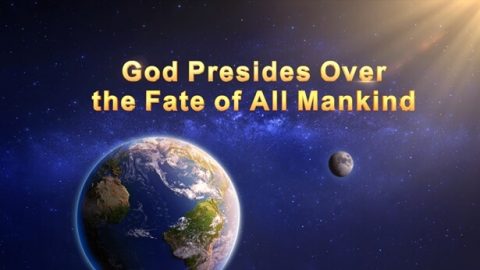3. You testify that The Word Appears in the Flesh was personally uttered by God, yet there are those who believe that these words were spoken by someone who was enlightened by the Holy Spirit. Just what is the difference between words expressed by the incarnate God, and words spoken by someone enlightened by the Holy Spirit?
Relevant Words of God:
The truth comes from the world of man, yet the truth among man is passed on by Christ. It originates from Christ, that is, from God Himself, and this is not something man is capable of.
—The Word, Vol. 1. The Appearance and Work of God. Success or Failure Depends on the Path That Man Walks
The truth is the most real of life’s aphorisms, and the highest of such aphorisms among all mankind. Because it is the requirement that God makes of man, and is the work personally done by God, thus it is called “life’s aphorism.” It is not an aphorism summed up from something, nor is it a famous quote from a great figure. Instead, it is the utterance to mankind from the Master of the heavens and earth and all things; it is not some words summed up by man, but the inherent life of God. And so it is called “the highest of all life’s aphorisms.”
—The Word, Vol. 1. The Appearance and Work of God. Only Those Who Know God and His Work Can Satisfy God
Whether the words spoken by God be plain or profound in outward appearance, they are all truths indispensable to man as he enters into life; they are the fount of living waters that enables man to survive in both spirit and flesh. They provide what man needs to stay alive; the principles and creed for conducting his daily life; the path, goal, and direction through which he must pass in order to receive salvation; every truth that he should possess as a created being before God; and every truth about how man obeys and worships God. They are the guarantee that ensures man’s survival, they are man’s daily bread, and they are also the sturdy support that enables man to be strong and stand up. They are rich in the truth reality of normal humanity as it is lived out by created mankind, rich in the truth by which mankind breaks free from corruption and eludes Satan’s snares, rich in the tireless teaching, exhortation, encouragement, and solace that the Creator gives to created humanity. They are the beacon that guides and enlightens men to understand all that is positive, the guarantee which ensures that men will live out and come into possession of all that is righteous and good, the criterion by which all people, events, and objects are measured, and also the navigation marker that leads men toward salvation and the path of light.
—The Word, Vol. 2. On Knowing God. Preface
The word of God cannot be made out to be the word of man, and still less can one make the word of man to be the word of God. A man used by God is not the incarnate God, and the incarnate God is not a man used by God. In this, there is an essential difference. Perhaps, after reading these words, you do not acknowledge them to be the words of God, but only as the enlightenment that man has gained. In that case, you are blinded by ignorance. How can the words of God be the same as the enlightenment that man has gained? The words of God incarnate open up a new age, guide all of mankind, reveal mysteries, and show man the direction he is to take in the new age. The enlightenment obtained by man is but simple instructions for practice or knowledge. It cannot guide all of mankind into a new age or reveal the mysteries of God Himself. When all is said and done, God is God, and man is man. God has the essence of God, and man has the essence of man. If man views the words spoken by God as simple enlightenment by the Holy Spirit, and takes the words of the apostles and prophets as words personally spoken by God, that would be man’s mistake. No matter what, you should never mix up right and wrong, or make high out to be low, or mistake the profound for the shallow; no matter what, you should never deliberately refute what you know to be the truth. Everyone who believes there is a God should inquire into problems from the correct standpoint, and accept God’s new work and His new words from the perspective of His created being; otherwise, they will be eliminated by God.
—The Word, Vol. 1. The Appearance and Work of God. Preface
Man’s ways of practice and his knowledge of the truth are all applicable to a particular scope. You cannot say that the path man treads is completely the will of the Holy Spirit, because man can only be enlightened by the Holy Spirit, and cannot be completely filled with the Holy Spirit. The things man can experience are all within the scope of normal humanity and cannot exceed the range of thoughts in the normal human mind. All those who can live out truth reality experience within this range. When they experience the truth, it is always an experience of normal human life enlightened by the Holy Spirit; it is not a way of experiencing that deviates from normal human life. They experience the truth enlightened by the Holy Spirit on the foundation of living their human lives. Moreover, this truth varies from person to person, and its depth is related to the state of the person. One can only say that the path they walk is the normal human life of someone pursuing the truth, and it may be called the path walked by a normal person enlightened by the Holy Spirit. One cannot say that the path they walk is the path the Holy Spirit takes. In normal human experience, because people who pursue are not the same, the work of the Holy Spirit is also not the same. In addition, because the environments people experience and the ranges of their experience are not the same, and because of the admixture of their mind and thoughts, their experience is mixed to different degrees. Each person understands a truth according to their different, individual conditions. Their understanding of the real meaning of the truth is not complete and is only one or several aspects of it. The scope of the truth man experiences differs from person to person in line with each person’s conditions. In this way, the knowledge of the same truth, as expressed by different people, is not the same. This is to say, man’s experience always has limitations and cannot completely represent the will of the Holy Spirit, nor can the work of man be perceived as the work of God, even if what is expressed by man corresponds very closely to God’s will, and even if the experience of man is very close to the perfecting work that the Holy Spirit performs. Man can only be God’s servant, doing the work that God entrusts to him. Man can only express knowledge enlightened by the Holy Spirit and truths obtained from his personal experiences. Man is unqualified and does not meet the conditions to be the outlet of the Holy Spirit. He is not entitled to say that his work is the work of God.
—The Word, Vol. 1. The Appearance and Work of God. God’s Work and Man’s Work
That which is directly expressed by God is truth. Anything that arises from the enlightenment of the Holy Spirit merely conforms to the truth, for the Holy Spirit enlightens people based on their stature and cannot express the truth directly to man. This is something you must understand. And when, based upon the words of the truth, people gain insights, and knowledge from experiencing, do such insights and knowledge count as the truth? At most, this is a little knowledge of the truth. Words enlightened by the Holy Spirit do not represent the words of God, they do not represent the truth, they do not belong to the truth; they are merely a little knowledge of the truth, a little of the enlightenment of the Holy Spirit. If people gain some knowledge of the truth and then supply it to others, then this, too, is the supply of personal knowledge and experiences. They are not supplying people with the truth. It can be said that this is fellowshiping the truth—this is a suitable way of putting it. Because this is not a simple matter and most people are unable to penetrate it completely, you must understand it clearly; it is not just a matter of accurate wording, or that you just need to understand some interpretation, and nothing more. You may have gained certain things from the truth, things that ought to be possessed by man, but this does not mean you have gained the truth. And you may have gained yet other things from the truth, but this does not mean you now possess the life of the truth, much less can it be said that you are of the truth—that is absolutely not the case. You have simply acquired something nutritious from the truth to nourish your life, so that there is something in you, something you should possess, that believes in God and satisfies God. God uses the truth to provide for people, allowing them, through the truth, to satisfy Him and be after His heart. Ultimately, even when people have entirely satisfied the will of God, they still cannot be said to be of the truth, much less can it be said that there is the life of the truth within them. … Everyone experiences the truth, but each does so under different circumstances, and everyone gains something different. Yet even if their knowledge were combined, they would still be incapable of fully articulating a single truth. That is how profound the truth is! Why is it said that the things you have gained and your knowledge cannot stand for the truth? You fellowship your knowledge with others, and it only takes two or three days of contemplation before they have fully experienced it. But people can spend a whole lifetime and still not fully experience the truth; even if what each person experienced were combined, the truth would still not be fully experienced. It can therefore be seen that the truth is extraordinarily profound. The truth cannot be fully articulated with words. In the language of man, the truth is the true essence of mankind. Man will never be able to fully experience the truth. Man should live by the truth. One truth can sustain the whole of mankind’s existence for several thousand years.
—The Word, Vol. 3. The Discourses of Christ of the Last Days. Part Three
The truth is the life of God Himself; it represents His disposition, His essence, and everything in Him. If you say that having a bit of experience means possessing the truth, then can you represent God’s disposition? You may have some experience or light regarding a certain aspect or side of a truth, but you cannot supply others with it forever, so this light you have gained is not truth; it is merely a certain point that people can reach. It is simply the proper experience and the proper understanding a person should possess: some actual experience and knowledge of the truth. This light, enlightenment, and experiential understanding can never substitute for the truth; even if all people had completely experienced this truth, and pooled together all of their experiential understanding, it still would not be able to take the place of that one truth. As has been said in the past, “I sum this up with a maxim for the human world: Among men, there is no one who loves Me.” This is a statement of truth; it is the true essence of life. This is the most profound of things; this is an expression of God Himself. You can keep on experiencing it, and if you experience it for three years you will have a superficial understanding of it; if you experience it for seven or eight years you will gain even more understanding of it—but any understanding you gain will never be able to substitute for that one statement of truth. Another person, after experiencing it for a couple of years, might gain a little understanding, and then a slightly more profound understanding after experiencing it for ten years, and then some further understanding after experiencing it for a lifetime—but if you both combine what understanding you have gained, even then—no matter how much understanding, how much experience, how many insights, how much light, or how many examples you both possess—all of that still cannot substitute for that one statement of truth. What do I mean by this? I mean that the life of man will always be the life of man, and no matter how much your understanding might accord with the truth, God’s intentions, and His requirements, it will never be able to be a substitute for the truth. To say that people have gained the truth means that they possess some reality, that they have gained some understanding of the truth, that they have attained some real entry to God’s words, that they have had some real experience with them, and that they are on the right track in their faith in God. Just one statement from God is enough for a person to experience for an entire lifetime; even if people were to experience it for several lifetimes or even several millennia, they still would not be able to completely and thoroughly experience a single truth.
—The Word, Vol. 3. The Discourses of Christ of the Last Days. Part Three




